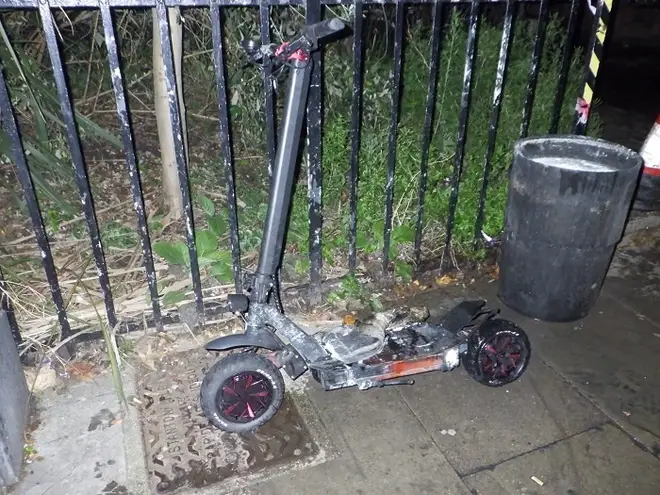
Paul Brand 7am - 10am
10 December 2021, 14:04

Electric scooters will be banned from all public transport in London from next Monday, amid fire safety concerns.
Passengers now face a £1,000 fine and could be refused travel if they are found carrying e-scooters or e-unicycles on public transport.
The new ban will apply across all of TfL including, the tube, buses, overground, TfL Rail, trams and the DLR and passengers caught
it comes after safety concerns were raised after one E-scooter caught fire on a packed tube train.
London Fire Brigade confirmed that a scooter had caught light on a train which was stopped at Parsons Green underground station last month.
Whilst no one was seriously injured, one passenger did suffer from smoke inhalation.
Read more: Boris under fire: PM's senior aide 'gave speech at Downing Street Christmas party'
Read more: Emergency Cobra meeting on Covid-19 and Omicron spread to be held today
Firefighters have tackled more than 50 fires involving escooters and ebikes in #London this year, which is why we're supporting a @TfL ban of private escooters across the transport network. It will come into force on Monday over fears they are a fire risk https://t.co/FIZnpeUxK9 pic.twitter.com/KlRrzksCYF
— London Fire Brigade (@LondonFire) December 10, 2021
The Brigade’s Assistant Commissioner for Fire Safety, Paul Jennings, said: "We have growing concerns about the safety of e-scooters and e-bikes due to the amount of fires we are seeing involving them, so we fully support TfL’s ban of private e-scooters on public transport.
"Fires are dangerous and terrifying wherever they happen, but a fire on the transport network has the potential to become very serious very quickly and involve hundreds of people, particularly on trains where evacuation may be challenging, so anything that can be done to mitigate that risk is a positive step."
TfL added: "E-scooters hired under our rental e-scooters trial have always been banned from TfL services because they cannot be folded. You can still carry - but not ride - non-motorised scooters on our services."
The ban comes just days after the Metropolitan Police Service launched a crackdown on the illegal use of e-scooters on the public highway and ScotRail is also considering a ban.
Read more: Minister: People can work at pub with pals but not the office - under 'crazy' Plan B rules
Read more: Polls in freefall as sleaze allegations and Christmas party storm hit PM

Should e-scooters be banned on TfL?
Today the Guide Dogs charity also calling for action to tackle illegal riding of e-scooters after conducting a study of the impact of a collision with pedestrians.
The study revealed an initial impact of hitting a pedestrian at 15.5 mph could cause moderate injury but it could be worse if someone falls and hit their head on the ground.
Chris Theobald, of Guide Dogs, said: "The trials of e-scooter hire schemes have sparked a boom in private sales, and we expect even more e-scooters to be bought as Christmas presents this month.
"We are urging the Government to work with the police to tackle illegal riding and make the public more aware of the law.
"If the Government is seriously considering fully legalising e-scooters on public roads, they need to get a grip on safety.
Read more: High Court reverses decision not to extradite Wikileaks founder Julian Assange to US
Read more: Covid: Face masks introduced for more indoor venues amid concerns over Omicron

Blind caller 'scared' to walk streets due to e-scooters on pavement
"Our testing shows that everybody is at risk, not just people with visual impairments.
"Any legislation to legalise e-scooters has to fully address speeds, weights, sound, and critically, keep e-scooters off the pavement where they can do significant harm."
Private e-scooters cannot legally be used in the UK except on private land, but are a common sight on roads and pavements in urban areas.
Dozens of legalised e-scooter rental schemes have been launched in towns and cities across Britain since July 2020 as part of Government trials, despite long-running safety concerns about the devices.